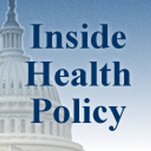| This article originally appeared in Inside Health Policy on December 16, 2021 After getting the Senate Finance Committee to ban Medicare from using a common metric for appraising drug prices, the government agency National Council on Disability is asking Congress to use the Build Back Better bill to prohibit the use of the quality-adjusted life years metric in all government programs. |
“In our most recent advice to Congress we advise that Congress extend those prohibitions [against the use of the QALY in the ACA] throughout federal programs,” National Council on Disability Chair Andrés Gallegos said Tuesday (Dec. 14) at a Partnership to Improve Patient Care event. “The Build Back Better Act is a tremendous opportunity to do so and to memorialize the protections with an unambiguous ban on the use of the QALY."
Drug appraisals are part of Medicare price negotiations in Build Back Better. Those evaluations consider therapeutic value, comparative effectiveness, expected revenues, research and development costs, and taxpayer financing. However, the bill prohibits comparative effectiveness research that devalues drugs for those who are younger and healthier.
“[T]he Secretary shall not use evidence or findings from comparative clinical effectiveness research in a manner that treats extending the life of an elderly, disabled, or terminally ill individual as of lower value than extending the life of an individual who is younger, nondisabled, or not terminally ill,” the drug pricing language states.
Sources say that’s code for QALYs.
However, the National Council on Disabilities says that language is too ambiguous and is asking Congress to clearly state that Medicare cannot use QALYs to determine the value of drugs.
The National Council on Disability wants Democrats to adopt language from the Affordable Care Act that prohibited QALYs for specific uses. The ACA stated that HHS “shall not use evidence or findings from comparative clinical effectiveness research conducted under section 1181 in determining coverage, reimbursement, or incentive programs under title XVIII in a manner that treats extending the life of an elderly, disabled, or terminally ill individual as of lower value than extending the life of an individual who is younger, nondisabled, or not terminally ill,” and instructed that the Patient-Centered Outcomes Research Institute (PCORI) “shall not develop or employ a dollars per-quality adjusted life year (or similar measure that discounts the value of a life because of an individual’s disability) as a threshold to establish what type of health care is cost effective or recommended.”
The National Council on Disability wants a similarly worded measure added to the end of Build Back Better’s section on Medicare price negotiation so it's clear the QALY ban applies to all Medicare drug price negotiation.
The group also wants the prohibition extended to all government programs.
National Association of Medicaid Directors Matt Salo said he had not heard of QALYs being used to perpetuate inequities.
“That’s certainly not what we would want to do,” Salo said. “Big picture, we need more tools for states to managed out of control drug prices, not fewer.”
Drug makers and patient groups say QALYs discourage the invention of drugs for patients with disabilities and fewer years to live. Eighty organizations asked the Biden administration to reject the measure and international reference pricing because other countries use it. QALY-based calculations are the most prominent method used by international drug appraisers and by the drug industry itself, according to the drug-appraisal nonprofit Institute for Clinical and Economic Review.

